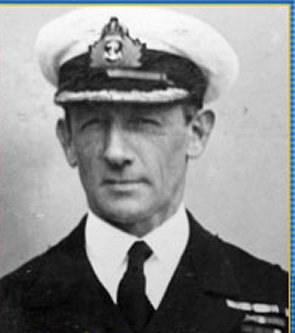Gerald Charles Dickens facts for kids
Quick facts for kids
Sir Gerald Charles Dickens
|
|
|---|---|

Admiral Sir Gerald Charles Dickens
|
|
| Born | 13 October 1879 Kensington, London, England |
| Died | 19 November 1962 (aged 83) London, England |
| Allegiance | |
| Service/ |
|
| Rank | Admiral |
| Battles/wars | World War I and World War II |
| Awards | Knight Commander of the Royal Victorian Order Companion of the Order of the Bath Companion of the Order of St Michael and St George |
| Spouse(s) | Kathleen Pearl Birch |
Admiral Sir Gerald Charles Dickens (born October 13, 1879 – died November 19, 1962) was an important officer in the Royal Navy. He was also the grandson of the famous Victorian novelist Charles Dickens.
Contents
Gerald Dickens was born in Kensington, London. His father, Sir Henry Fielding Dickens, was a lawyer. His family had interesting roots, including French, Bohemian, and German backgrounds. His great-grandfather was a well-known composer and pianist named Ignaz Moscheles.
In 1894, Gerald joined the naval college HMS Britannia in Dartmouth. This was where he began his journey to become a naval officer. He served on several ships, including HMS Blake and HMS Eclipse. He traveled to places like the East Indies Station. In 1899, he became a Sub-Lieutenant. He continued his training at the Royal Naval College, Greenwich. Later, he served with the Mediterranean Fleet on ships like HMS Griffon.
Serving in World War I
Gerald Dickens became a lieutenant in 1902. When World War I started in 1914, he was promoted to commander. He was in charge of HMS Harpy in the Mediterranean Sea from 1913 to 1915. He took part in the Gallipoli Campaign in 1915, which was a major battle.
From 1917 to 1918, he worked as a special commander for the head of the Mediterranean Fleet. In 1919, he became a captain. He also received an award called the CMG for his excellent service.
Between the World Wars
After World War I, Captain Dickens continued his important work. He was part of the teaching staff at the Imperial Defence College from 1926 to 1929. He then commanded HMS Repulse, a large warship, from 1929 to 1931.
He served as a naval assistant to King George V from 1931 to 1932. In 1932, he was promoted to rear admiral. From 1932 to 1935, he was the Director of Naval Intelligence. This meant he was in charge of gathering important information for the navy. He received another award, the CB, in 1934. In 1936, he became a vice admiral. He retired from active duty in 1938 but was named an Admiral (Retired) in 1940.
Role in World War II
Even though he had retired, Admiral Dickens was called back to duty in 1939 for World War II. He served as a naval attaché in The Hague, Netherlands, starting in February 1940. This was during the German invasion. He helped with important communications and planning.
After the Netherlands surrendered, he went back to Britain. He then worked as a main contact officer for the Allied Navies. He played a key role in making sure the Dutch and British navies worked well together. He also served in Tunisia from 1943 to 1944. Later, he was the Flag Officer for Holland from 1944 to 1945, when he retired for good. For his service, he received awards from the United States and France.
Later Life and Family
Sir Gerald Dickens passed away in London in 1962 at the age of 83. He was buried at sea near Chatham. He had a son, Captain Peter Dickens, who also served in the Royal Navy. His grandson, Gerald Charles Dickens, is an actor, as is his great-grandson, Harry Lloyd.
Awards and Honors
Sir Gerald Dickens received many awards for his bravery and service:
- 1916 – He was mentioned in official reports for his service during the Gallipoli Campaign.
- 1918 – He received the Chevalier of the Légion d'honneur from France.
- 1919 – He was made a Companion of the Order of St Michael and St George (CMG).
- 1920 – He received the Commander of the Order of the Crown of Italy from Italy.
- 1934 – He became a Companion of the Order of the Bath (CB).
- 1937 – He was made a Knight Commander of the Royal Victorian Order (KCVO).
- He also received the Grand Cross of the Order of Orange-Nassau from the Netherlands.
- 1945 – He was awarded the Commander of the United States Legion of Merit for his work in Tunisia.
- 1949 – He received the Grand Officer of the Order of Leopold from Belgium.
See also
- Dickens family
 | Anna J. Cooper |
 | Mary McLeod Bethune |
 | Lillie Mae Bradford |

